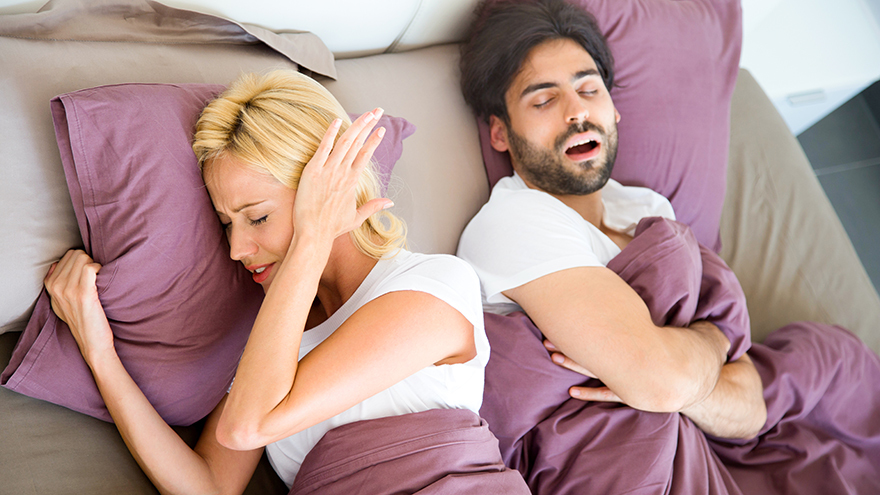Stop Snoring Now

Whether you feel you’re a light or deep sleeper, there are certain noises or disturbances which prevent us slipping off to the land of nod. Undoubtedly one noise which frustrates the majority of us is the unmistakable sound of snoring, particularly if your partner is a serial offender.
Sleepy People, who offer a fantastic collection of bedding, pillows, duvets and mattress toppers, want to help you get the best night’s sleep possible and that’s why they have put together this list of 10 ways to stop your partner snoring.
1 Try Different Sleep Positions
Sleeping flat on your back is considered the worst position for snoring. This is because the base of your tongue relaxes onto the back wall of your throat, causing extra vibration during your sleep, increasing the possibility of snoring.
If your partner does tend to lie on their back, ask them to try sleeping on one side.
2 Change Your Pillows
Allergens can gather in your bedding, something which washing your pillowcases just won’t clear up. These can contribute to issues such as snoring. The simple solution is to invest in some new pillows, like Silentnight Anti-Snore Pillow (£14.99), that support the head and neck to encourage better breathing and reduce snoring – which will not only benefit the user but also those sleeping in close proximity.
3 Lose Weight
While it isn’t a contributing factor in every case, being overweight can increase the chance of snoring. Gaining weight around your neck can squeeze your throat slightly, increasing the likelihood of it collapsing during the night, causing you or your partner to snore.
If you or your partner are overweight, losing weight can help stop snoring.
4 Improve Your Sleep Habits
In an ideal world, we would all enjoy the recommended 8 hours sleep per night. However, the majority of us understand that due to one reason or another, it isn’t always possible.
Sleeping odd hours or consistently not getting enough shut-eye makes you overtired. This means when you finally do grab some sleep, your body relaxes and falls into deeper sleep much quicker, increasing the possibility of snoring.
5 Keep Hydrated
To keep healthy and stay hydrated, men should drink around 15 cups of water a day, whilst women should drink around 11.
Falling short of this amount means that part of your nose and soft palate become stickier, which can cause snoring. If your partner doesn’t drink the recommended amount, see if drinking more could help. It could be one of the easiest and all-round healthy solutions.
6 Steer Clear of Alcohol
Sedatives and alcohol have a similar effect on your muscles as being overtired, therefore increasing your chances of snoring.
Drinking within 4-5 hours of going to sleep can increase the chances of your partner snoring, so keep a close eye on both your booze and your watch.
7 Take A Hot Shower
Unsurprisingly, the clarity of your nasal passages can contribute to snoring. If your partner tends to be more of a nasal snorer, then a hot shower before bed could be the perfect remedy.
The hot water can help widen nasal passages, which is particularly helpful if they are currently suffering from a cold. Also, try keeping a bottle of saltwater in the shower and use it to rinse out the nose as this can help.
8 Try Some Nose Strips
Something you will have likely seen in chemists or on television adverts is nose strips. This is another aid for those who snore through the nose.
If using these (or other nose remedies) doesn’t improve snoring issues, it is likely that the problem lies elsewhere.
9 Quit Smoking
Smoking irritates the membranes inside the throat and nose, which can reduce the airways and cause snoring.
10 Try An Anti-Snoring Mouthpiece
There are a number of different mouthpieces on the market which claim to improve your breathing. Check the ratings and reviews of different products because the prices and quality can vary.
Above all else, snoring is unquestionably frustrating if it keeps you awake. So, if your partner snores like there’s no tomorrow, but you can’t find any remedy, speak to a health professional as it might be part of a bigger health issue.
For tips about getting a good night’s sleep in the heat . . .





